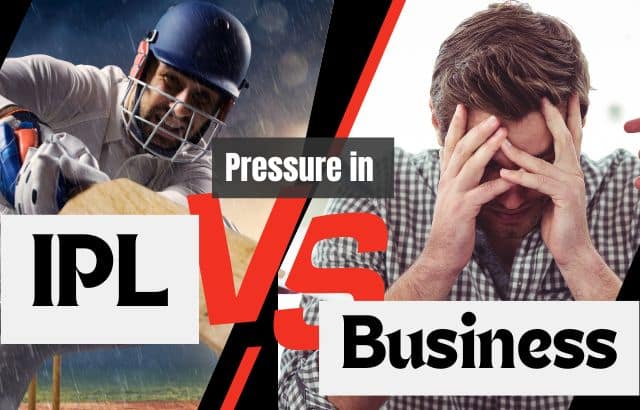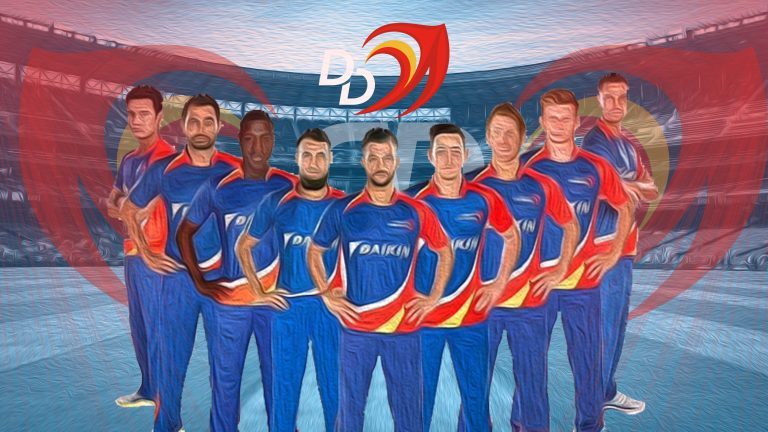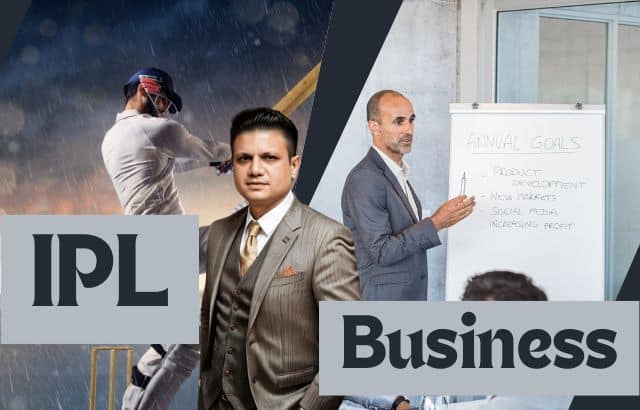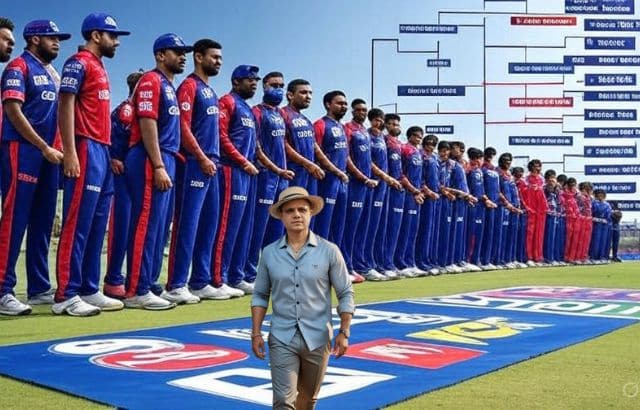The Indian Premier League (IPL) is more than just a cricket tournament. It’s a high-stakes, high-drama sporting event that brings together the world’s best cricketers, billion-dollar brands, celebrity owners, and millions of passionate fans. Played every year between March and May, IPL features 10 franchise teams representing different Indian cities, all competing in a fast-paced Twenty20 format.
What makes IPL special isn’t just the entertainment—it’s the blend of business, leadership, strategy, pressure, and execution. Behind every match are decisions about player auctions, sponsorships, media rights, fan engagement, injury management, and more.
It’s not just a sport—it’s a stage for business lessons.
Whether you’re a startup founder, business leader, or aspiring entrepreneur, IPL offers a rich playground of insights that mirror real-world business dynamics. From leadership and planning to dealing with pressure and unpredictability, there’s a lot to learn.
Now, let’s dive into how IPL connects directly to your business journey.
Table of Contents
🏏 1. What is IPL—and why is it more than just cricket?
When most people think of the Indian Premier League (IPL), they picture big sixes, passionate fans, star players, and celebrity owners. But IPL is more than just a sport. It is one of the most successful and sophisticated business models in modern India.
The IPL is a multi-billion-dollar ecosystem. It combines the forces of sports, media, entertainment, finance, technology, and branding. Each team operates like a high-performance company. Behind every match lies a strategy meeting, brand partnership decision, revenue goal, and leadership challenge. From auctions to sponsorships, from injury management to fan engagement—everything is planned and executed like in a fast-moving business environment.
Just like in business, the IPL involves:
- High-stake decisions
- Performance under pressure
- Team building and leadership
- Adaptability and innovation
- Customer (fan) engagement
The parallels are countless. Consider the team auction: franchises spend crores to pick players who fit their team culture, just like companies invest in hiring the right people. Matches are broadcasted with brand tie-ups, just like businesses run marketing campaigns around product launches. Every decision—whether to bat first or change the bowling lineup—is like making a strategic move in a quarterly review.
“IPL isn’t just a cricket league. It’s a business classroom where each game is a case study in strategy, leadership, and pressure management.” — Hirav Shah, Business Strategist
What makes IPL such a compelling business case is its uncertainty. A team that was at the bottom of the table last week can jump to the top with two wins. A benchwarmer can suddenly wear the Orange Cap. And a captain’s one decision can make or break the season.
Just like startups and corporates, IPL teams have to think fast, perform daily, innovate constantly, and manage failure with grace. The speed, visibility, money, and pressure involved make IPL one of the most dynamic business theaters of our time.
So, the next time you watch an IPL match, think beyond the runs and wickets. Ask yourself:
- How is this team handling pressure?
- What strategy are they using today?
- What can I learn and apply to my business?
Because IPL isn’t just cricket. It’s business in disguise—with better lighting and louder fans.
💼 2. What is business—and why is it just like IPL?
Business isn’t just about selling products or making profits. At its core, business is about solving problems, serving people, creating value, managing teams, building systems, and handling pressure—every single day.
Now compare that to IPL. What happens in IPL?
- Teams solve problems: how to win this match, how to rotate bowlers, how to chase targets.
- Teams serve fans, sponsors, and owners.
- Teams create value through entertainment, brand reach, and performance.
- Teams face pressure every day: from the audience, media, investors, and themselves.
Sounds familiar?
Every business owner, founder, or CEO is like an IPL team manager or captain. They have to:
- Recruit and retain the best talent
- Strategize every move
- Lead the team under high expectations
- Execute plans quickly and adjust when needed
- Stay focused on the bigger picture despite daily ups and downs
“Business is not a calm ocean. It’s a pitch that changes every day. You can’t play the same shot twice.” — Hirav Shah
Let’s say you run a digital marketing agency. Some days your campaign hits, and you get 10 new clients. Some days nothing works. It’s like a match: sometimes you score 80 runs. Sometimes, you get out on the first ball. That’s part of the game.
Just like IPL players train for physical and mental strength, business leaders must train their:
- Mindset (resilience and confidence)
- Strategy (planning and innovation)
- Skills (communication, finance, branding)
And just like IPL teams can’t control the weather or the toss, businesses can’t control the economy, client mood, or competition. But what you can control is your preparation, adaptability, and attitude.
So yes, business is unpredictable. But so is IPL.
That’s what makes both of them exciting. That’s what separates amateurs from professionals. Not every business wins every day. Not every team wins every match. The goal is to stay in the tournament, keep improving, and keep believing.
Because in both IPL and business, you’re only as good as your next performance.
🤝 3. How are IPL players and business leaders alike?
What makes someone a great IPL player? Is it just talent? Is it only about who hits the most sixes or bowls the fastest?
Not really. Great IPL players are a combination of skill, mindset, leadership, fitness, and the ability to stay calm under pressure. They show up on time. They learn from failures. They bring energy to the team. They lift others up.
Now think about a great business leader. A successful entrepreneur. A visionary CEO.
- Are they the smartest in the room?
- Do they always get things right?
- Do they never face failure?
No. Like cricketers, great leaders:
- Train constantly
- Lead teams through uncertainty
- Perform under pressure
- Accept mistakes and grow fast
- Stay humble and hungry
“Every IPL match is like a business quarter. The player is the performer. The captain is the CEO. The fans are your customers. And the owners? They want returns.” — Hirav Shah
Take the example of MS Dhoni. He doesn’t shout or overreact. He remains composed, backs his team, and makes smart decisions under pressure. Isn’t that what a great startup founder must do?
Or look at Virat Kohli—his passion, discipline, and hunger to grow year after year. That’s what a business leader needs to build a brand that lasts.
Also, just like players go through form slumps, business owners go through tough months. Revenue drops. Clients leave. But it’s not about staying perfect—it’s about showing up, day after day, and giving your best.
📌 Example: You may have launched a product that failed. But that doesn’t make you a failed founder. It makes you a founder who knows what doesn’t work. Like a player who learns to play spin better after getting out multiple times.
Whether on the pitch or in the boardroom:
- You need stamina.
- You need courage.
- You need to keep reinventing.
Because players and business minds are not that different. They are performers in different stadiums.
So ask yourself: are you training like a player or just showing up like a spectator?
Because business isn’t a game of luck. It’s a game of preparation.
📊 4. How does one team’s win or loss affect others in IPL—and in business?
One of the most exciting things about the IPL is the points table. Every match can shake it up. A team that was in the top 4 yesterday might drop after one loss. A team that was nearly out of the tournament suddenly rises in the rankings because someone else lost.
That’s not just sports. That’s interdependency.
In business, the same thing happens. What your competitors do can directly impact your performance—even if you’ve done nothing wrong.
Here’s how:
- A competitor lowers prices. Your customers start comparing.
- A new product goes viral. Your offering suddenly looks old.
- A supply chain problem at their end floods demand on your side.
🎯 Lesson: Your business doesn’t exist in isolation. You are always part of a larger, moving market.
Let’s look at a real example. Zomato and Swiggy are in constant competition. If Swiggy launches a new feature or discount program, Zomato has to respond—not because it’s failing, but because the game just changed.
Or let’s say you own a clothing brand. Suddenly, a celebrity endorses a competitor’s brand. Your online traffic drops—not because your product is worse, but because consumer attention has shifted.
“In both IPL and business, one team’s success can change the fate of another—even if they never directly compete.” — Hirav Shah
This is why monitoring your industry is as important as managing your internal team. You may have the best team, best product, and best intentions—but if the market shifts due to someone else’s move, you must adapt quickly.
IPL teams always keep one eye on the match they’re playing—and the other on the scoreboard and net run rate. Businesses must do the same. Focus on your goals, but be aware of:
- Competitor launches
- Market trends
- Customer behavior shifts
Because sometimes, you win not just by performing—but by responding faster to what’s happening around you.
And that’s the hidden game most entrepreneurs ignore.
📊 5. What is pressure in IPL—and how does it compare to business pressure?
Imagine being on the field with thousands of fans screaming, your team counting on you, and just one ball left to win the match. The weight of the moment, the expectations, the unpredictability—that’s pressure in IPL.
It’s not just physical. It’s mental, emotional, and strategic. And it happens every single game.
Now step into the shoes of a business leader.
- You’re about to pitch to an investor.
- You have to deliver on a tight deadline.
- Your top client is threatening to leave.
- Sales are down, and your team is looking to you for answers.
This too is pressure.
In both IPL and business, pressure is not an exception—it’s the default.
“You can’t eliminate pressure. But you can learn to thrive in it. That’s the mark of a true leader.” — Hirav Shah
In IPL:
- Bowlers must keep calm even after being hit for 20 runs in an over.
- Batsmen must stay focused while chasing a big total.
- Captains must make bold decisions in split seconds.
In business:
- Founders must remain composed during crises.
- CEOs must keep morale high during market downturns.
- Managers must act fast when things don’t go as planned.
Let’s take a simple example. Think of a food delivery app. One weekend, the app crashes due to high orders. Social media is full of angry tweets. The founder has two options:
- Panic and blame the tech team.
- Stay calm, communicate clearly, fix the issue fast, and turn the crisis into a customer care opportunity.
This is the same as a cricketer getting hit for a six and still delivering the perfect yorker next ball.
🎯 Lesson: Pressure doesn’t break leaders. It reveals them.
That’s why IPL is such a great mirror for business. It shows us that success doesn’t always belong to the most talented. It belongs to those who stay clear, calm, and committed under fire.
If you’re running a business, you’ll face pressure in many forms:
- Financial stress
- Deadlines
- People problems
- Competition
You can’t control these pressures entirely. But you can:
- Build routines to stay grounded
- Focus on clarity, not chaos
- Prepare for high-stress moments in advance
Because pressure is not the enemy. In fact, it’s a privilege. It means you’re playing at a level where the game matters.
So the next time you feel pressure in business, think of it like the last over of a tight IPL game. Your calmness can decide whether it ends in panic—or in celebration.
🧠 6. How do players handle pressure—and what can entrepreneurs learn?
Handling pressure is not a matter of luck or personality. It’s a skill—and like all skills, it can be learned and strengthened.
Think about a fast bowler in IPL. He’s just been smashed for back-to-back sixes. The crowd is roaring. The captain walks over with a few calm words. And now, it’s time for the next delivery.
What does he do? He breathes. He resets. He focuses. And he bowls the perfect yorker.
That’s pressure handling in action.
Business leaders face the same thing. You lose a client. Your product fails. Your ad campaign didn’t bring leads. People expect you to break down. But instead, you:
- Breathe.
- Reset.
- Focus.
- Make your next move.
“Pressure creates diamonds—but only if you handle it well. You don’t rise under pressure—you rise through preparation.” — Hirav Shah
So what are some techniques IPL players use that entrepreneurs can learn from?
1. Mental conditioning
Players practice visualization. They prepare mentally for different match situations. Entrepreneurs can do the same—rehearse pitches, imagine setbacks, and visualize solutions.
2. Short memory
The best players forget failure fast. They don’t carry yesterday’s mistake into today’s performance. Leaders must learn to forgive themselves, bounce back, and start fresh.
3. Focus on controllables
A player can’t control the pitch or the umpire’s call. But he can control his technique. Similarly, entrepreneurs can’t control market sentiment, but they can control effort, attitude, and response.
4. Team trust
IPL players lean on teammates for support. Entrepreneurs must learn to share the load. Having mentors, advisors, or even just a sounding board helps reduce pressure.
📌 Example: Imagine a startup founder facing a failed product launch. Instead of panicking, she calls a mentor, regroups with the team, and pivots the offer. Within a week, sales return.
That’s pressure handling. Not avoiding the storm—but knowing how to sail through it.
🎯 Lesson: Resilience is not just recovery. It’s intelligent recovery.
Whether you’re on the field or in a boardroom, pressure is inevitable. But panic is optional.
So ask yourself: Do I freeze under pressure, or do I prepare for it?
Because in both IPL and business, those who prepare best, perform best.
🧠 7. Why is mindset the real gamechanger in both IPL and business?
Have you ever wondered why some players rise in the most difficult matches while others fade, even if they’re more skilled? Or why some startups survive downturns while others collapse, even with more funding?
The answer is mindset.
Mindset is not just about being positive. It’s about how you think when things don’t go your way. It’s how you behave when you’re losing. It’s what keeps you going when you feel like giving up.
In IPL, mindset is the difference between:
- A bowler who chokes under pressure and one who bowls a perfect final over.
- A batsman who panics during a chase and one who anchors the innings.
- A captain who crumbles after back-to-back losses and one who inspires a comeback.
“Mindset doesn’t control the outcome, but it controls how far you go—especially when nothing else seems to work.” — Hirav Shah
Now think about business.
- A founder who fails in their first startup but comes back stronger in the second.
- A team that loses its biggest client but uses it as a chance to improve operations.
- A company that doesn’t stop because of criticism but listens, learns, and levels up.
🎯 That’s mindset at work. And it’s more valuable than capital, marketing, or strategy—because it drives all of them.
How do IPL players build strong mindset—and what can you learn?
- They train the brain, not just the body.
- Coaches work on confidence, focus, and clarity—just like you should work on mental clarity before investor meetings or product launches.
- They don’t overthink failure.
- A dropped catch or a bad shot doesn’t define the player—just like one bad month doesn’t define your business.
- They stay focused on growth.
- Even after a great knock, top players return to nets. They know there’s always another level.
📌 Example: Take KL Rahul. Criticized in the media. Trolled online. But he keeps showing up, adjusts his technique, and performs. That’s a mindset in action—not giving power to outside noise.
In business, how strong is your mindset?
- Do you bounce back from rejection quickly?
- Do you focus on the next step or obsess over past mistakes?
- Do you see failure as feedback or personal attack?
Mindset won’t remove your obstacles. But it will help you face them without fear. And that alone makes all the difference.
So ask yourself: When things go wrong—do I break down, or break through?
Because whether it’s IPL or business, mindset isn’t everything—but without it, everything else falls apart.
🗓 8. How planning for each IPL game is like planning each business day?
Have you noticed how IPL teams never treat two games the same? Every match comes with a new strategy. Different pitch, different opposition, different game plan.
Before every match, there’s a meeting. The coaches, analysts, and captain review:
- Who’s playing well?
- What’s the pitch like?
- What strategy suits today’s conditions?
The best teams don’t go in blindly. They go in prepared—with flexibility. Because no match is won with yesterday’s strategy.
Business works exactly the same way.
You may have long-term goals, but what you do today decides whether you get closer to them. Every business day brings different variables:
- A client might change a brief.
- A teammate may call in sick.
- A sudden market trend might emerge.
If you go in without a plan, you’re reacting. But if you enter the day like a captain before a game—ready with options—you’re leading.
“In business, every day is a match. Every hour is an over. And the day’s plan is your winning strategy.” — Hirav Shah
What business leaders can learn from IPL planning:
- Start with a huddle.
- IPL teams begin with a team meeting. Business teams should do the same—set the focus, assign roles, review yesterday.
- Play according to the pitch.
- If the market is slow today, adapt your messaging. If your audience is online, adjust your timing. Don’t repeat yesterday’s plan just because it felt safe.
- Assign clear roles.
- IPL teams define who opens, who finishes, who bowls at the death. In business, you must define roles clearly: Who’s leading the call? Who’s owning the client report? Who’s watching competitors?
📌 Example: A startup that begins each day with a 15-minute team call, reviewing key deliverables, addressing blockers, and clarifying goals, often outperforms bigger firms. Why? Because they plan like a professional sports team.
🎯 Lesson: Winning is not a one-time act. It’s the result of daily discipline.
When you plan your day with intention, you remove confusion and increase confidence. You show up not just busy—but prepared.
So the next time you open your calendar or enter a Monday meeting, ask yourself: Am I walking into this day with a strategy? Or just hoping to get lucky?
Because in IPL and in business, luck favors the team with the better game plan.
🛠 9. What behind-the-scenes work matters more than the spotlight?
When we watch an IPL match, we see the players, the crowd, the scoreboard, and the high-pressure moments. What we don’t see are the hours of preparation, the support staff, the data analysis, the physiotherapists, and the silent effort that powers every performance.
Without the behind-the-scenes team, even the best players can’t succeed.
The same holds true in business. Customers may see the product, the brand, the marketing—but they don’t see:
- The accounting team ensuring cash flow.
- The logistics team getting your deliveries on time.
- The IT team fixing bugs no one knows about.
- The operations team keeping the engine running.
“The best-run companies are like IPL teams—you may cheer for the stars, but the real success comes from the support system you don’t see.” — Hirav Shah
Let’s take the example of a successful product launch. Customers see the landing page and maybe a social media ad. But they don’t see:
- The months of product development
- The endless feedback loops from beta users
- The marketing team testing 50 versions of the same ad
- The copywriter rewriting the pitch 20 times
🎯 Lesson: Great businesses, like great teams, invest deeply in what the world never sees.
What business owners can learn from IPL’s support systems:
- Value every role.
- Even a backup bowler becomes critical when a star gets injured. In business, never overlook the junior staff—they often save the day in emergencies.
- Build a reliable bench.
- IPL teams rotate players based on form and conditions. Businesses should train team members to be multi-skilled so that workflows don’t stop when someone is absent.
- Prepare silently.
- Most of IPL’s brilliance is rehearsed off-camera—in nets, strategy rooms, and training grounds. Businesses must prepare processes and responses for every what-if scenario.
📌 Example: A company whose tech team runs weekly stress tests rarely crashes during actual peak periods. Their users never know it, but they are protected by solid prep work.
So ask yourself:
- Are you applauding only the visible wins?
- Are you appreciating and investing in the background systems?
- Are you building a team that performs—even when no one is watching?
Because just like cricket, business is won backstage—long before the spotlight turns on.
🧩 10. Why strategy must change when the pitch—or market—changes?
In IPL, no two pitches are the same. A flat pitch in Mumbai is different from a turning track in Chennai. Even the time of day—afternoon heat or evening dew—can completely change how the game is played.
That’s why captains and coaches make adjustments before and during every match. They change the batting order. They shuffle bowlers. They adapt to what the field is offering—not what they wish it would offer.
The same is true in business. Markets shift. Customer preferences evolve. Technology disrupts industries overnight. A strategy that worked brilliantly six months ago may now be outdated.
“The most dangerous thing in business is sticking to a strategy just because it once worked. Great leaders adapt like great captains—they read the pitch before making the play.” — Hirav Shah
Here’s how IPL teaches strategy flexibility:
- Read the field conditions.
- In cricket, captains study the pitch and weather. In business, study your market. What are your customers saying? What’s trending in your industry?
- Pick your playing 11 accordingly.
- A team doesn’t use the same squad for every game. You shouldn’t use the same approach for every project. Different conditions require different skill sets.
- Mid-game changes are allowed.
- A bowler gets hit—you switch the plan. A business campaign flops—you revise, relaunch, reframe.
📌 Example: Consider how Netflix evolved. They started as a DVD rental service. As the market shifted, they moved to streaming. When competition increased, they began creating original content. Their pitch changed, and so did their strategy.
🎯 Lesson: In both IPL and business, being flexible isn’t optional. It’s essential.
Ask yourself:
- Am I repeating last year’s plan in a changed market?
- Am I willing to let go of my old approach?
- Do I have a team that’s open to changing tactics?
Sticking to a game plan that no longer suits the field is not bravery—it’s blind stubbornness.
In a fast-moving world, the winners are not those with the best fixed plan. They’re the ones with the smartest flexible plan.
So whether you’re batting in the heat or trying to sell in a slump—adjust your stance, and play the ball that’s coming at you now.
🧢 Final Thought: Are you leading like a captain—or just playing along?
Every IPL team has 11 players on the field, but not everyone is leading. The captain stands apart—not because they play better, but because they carry responsibility.
Captains:
- Read the game situation.
- Make bold calls under pressure.
- Inspire the team when morale is low.
- Take ownership of results—good or bad.
Business is no different.
In every business, there are doers and there are leaders. A true business leader is like a captain. They don’t wait for someone to tell them what to do. They observe, decide, and act.
“A leader in business isn’t the loudest voice in the room. It’s the one who sees clearly when others panic—and leads calmly when others complain.” — Hirav Shah
How to think like a captain in your business:
- Take ownership.
- Wins are shared, but losses? Own them. That’s leadership.
- Make decisions.
- Even if you’re unsure, make the best possible call and learn from it. Indecision kills momentum.
- Lift your team.
- A good captain brings the best out of others. Are you motivating, mentoring, and managing well?
- Stay calm.
- Everyone’s watching your reaction. Composure inspires confidence.
📌 Example: Think of a founder whose team is demotivated after losing a major client. Instead of blaming, they regroup the team, share the vision, and initiate a new campaign. The team feels supported—and performs better.
That’s not luck. That’s leadership.
Ask yourself:
- Am I blaming the pitch, or adjusting my game?
- Am I building others, or just focusing on myself?
- Am I just playing for today—or leading for the season?
🎯 Lesson: Every business needs players. But growth demands captains.
So whether you’re running a startup, managing a team, or leading a company, the question is:
Are you just participating? Or are you truly leading?
Because in both IPL and business, the trophy doesn’t go to the team with the best players. It goes to the team with the best leadership.
❓ FAQs
Q1: I don’t watch IPL. Will this still help me?
Absolutely. IPL is just the example. The real lessons are about leadership, decision-making, planning, and pressure management—all of which apply in any business.
Q2: How can I start building a mindset like an IPL player?
Start with daily rituals: morning focus time, journaling your goals, visualizing outcomes, and reviewing what went wrong—without blaming others.
Q3: What’s the biggest mistake business owners make under pressure?
Reacting emotionally. Like a player losing control after one bad over, business owners must learn to pause, think, and reset.
Q4: Can these ideas apply to small businesses or only startups?
Any business—whether a corner shop or a tech startup—deals with competition, customers, and pressure. These lessons apply to all.
Q5: How do I know when to change strategy?
When your results aren’t improving despite effort, when customer feedback changes, or when the market environment shifts significantly.
📝 Exercise: Apply IPL Lessons to Your Business
Take 15 minutes and answer these questions honestly:
- How do I handle pressure in my business?
- Write 2 recent examples. Did you stay calm or react emotionally?
- What’s one thing I do to prepare daily—like an IPL team does before a match?
- Am I more of a player or a captain in my current business role? Why?
- When was the last time I changed my strategy to suit a new condition? What happened?
- What part of my business needs better behind-the-scenes support?
Use these answers to reflect and build your own “Match Day Strategy” for business.
About the Writer
This article is authored by Hirav Shah, a globally respected Business Strategist, founder of the world’s first Business Decision Validation Hub and author of 18 strategy books. His 6+3+2 framework and Astro Strategy approach have helped business owners, startups, and CEOs across industries make sharper decisions and achieve breakthrough results.























